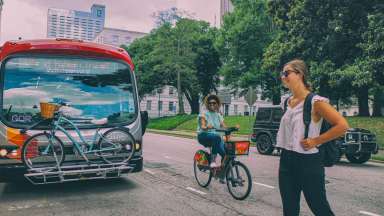
FAQ: Clean Transportation Ordinance
Updated: Jun 5, 2024
- Department:
- SustainabilityPlanning and Development
Thank you for printing this page from the City of Raleigh's Official Website (www.raleighnc.gov)
https://raleighnc.gov/climate-action-and-sustainability/services/faq-clean-transportation-ordinance
06/05/2024 5:29 pm

Updated: Jun 5, 2024
Update - City Council unanimously approved this ordinance at its June 4 meeting, and it will take effect in July. Updates will be added to this page in the coming weeks.
Clean Transportation Ordinance
Creating a more walkable, equitable, healthy, and accessible community and taking action on climate change
We recognize that many existing apartments do not have EV charging. In some cases, property managers are adding chargers as EV ownership increases. The City is also exploring ways to improve access to EV charging more broadly. Learn more about the City’s Transportation Electrification work.
The Ordinance would not mean that existing drive-thrus in the affected areas must close. They may continue to operate. However, if a drive-thru goes out of business for an extended period of time, it would not be able to reopen.
The limitation on new drive-thrus is not being proposed to apply everywhere in the city. It would apply to downtown and other walkable areas, but it would not affect the majority of the city. So new drive-thrus can continue to be built in many locations across the city. The Ordinance also would not prohibit existing drive-thrus from continuing to operate.
People with mobility issues or who have disabilities are far less likely to drive than those without disabilities. According to the U.S. Bureau of Transportation Statistics, 92% of people without disabilities drive, while only 60% of people with disabilities drive. For those with mobility issues, having safe and comfortable pedestrian access to restaurants or other destinations is critical to being able to carry out day-to-day activities. This ordinance will help provide better access for those in these groups.
However, we also recognize that having access to drive-thrus is important for some people who have mobility issues. The Ordinance seeks to create more of a balance than we have today. It will help create areas that are accessible without a car while also allowing amenities like drive-thrus in various parts of Raleigh to serve residents.
If you have a question, you can call or email Jason Hardin in the Office of Sustainability at Jason.Hardin@raleighnc.gov or 919-996-4256.
The draft ordinance and additional information are available on the online portal for review and comments. See slides from an online informational meeting here.
The ordinance is a change to the Unified Development Ordinance (UDO), which governs new construction and redevelopment of existing properties. It is called a "Text Change," because it is a change to the wording of the existing ordinance, not a change to the city's zoning map. More information about the process, including pending changes, is on the Text Change page.
No. They also apply only to new development or redevelopment.
Yes. Many cities across North Carolina, including Charlotte, Apex, and Holly Springs, have created similar EV charging requirements.
Many also have prohibited new drive-thrus in their downtowns or similarly walkable areas. Raleigh also has done this in areas that will be served by major transit investments.
All cities have requirements for new transportation infrastructure when new homes and offices are built. This is an opportunity for Raleigh to ensure that the new infrastructure doesn’t leave out opportunities to improve walkability along with vehicle access.